US issues new sanctions as it dials up pressure on Iran

Washington penalties target oil vessels as Trump administration intensifies ‘maximum pressure’ campaign against Tehran. Listen to this article Listen to this article | 2 mins info Published On 25 Feb 202625 Feb 2026 Click here to share on social media share2 Share plus2googleAdd Al Jazeera on Googleinfo The United States has issued a new wave of sanctions against Iran, targeting ships that it said are selling Iranian oil to help fund the country’s ballistic missile programme. The penalties on Wednesday come a day after President Donald Trump renewed his threats against Iran in his State of the Union address. Recommended Stories list of 3 itemsend of list “Iran exploits financial systems to sell illicit oil, launder the proceeds, procure components for its nuclear and conventional weapons programs, and support its terrorist proxies,” Secretary of the Treasury Scott Bessent said in a statement. “Under President Trump’s strong leadership, Treasury will continue to put maximum pressure on Iran to target the regime’s weapons capabilities and support for terrorism, which it has prioritised over the lives of the Iranian people.” While the US describes the Iranian oil trade as “illicit”, Iran, which is selling its own petroleum products, describes the crackdown on its energy sector as piracy. The US has been intensifying sanctions against Iran as it amasses military assets – including two aircraft carriers and large fleets of fighter jets – in the region in apparent preparation for war. Wednesday’s penalties targeted 12 vessels, as well as several companies and individuals that the US said are involved in Iran’s oil sales and weapons acquisition. The new sanctions will freeze targeted assets of the designated firms and individuals in the US and make it mostly illegal for American citizens to engage in financial transactions with them. Advertisement Washington has been piling such sanctions on the Iranian economy since Trump nixed the multilateral nuclear deal with Tehran in 2018 during his first term. That agreement, known as the Joint Comprehensive Plan of Action (JCPOA), saw Iran scale back its nuclear programme in exchange for the release of international sanctions. After returning to the White House in 2025, Trump reignited his economic maximum pressure campaign against Tehran with the goal of choking off Iran’s oil exports. Still, the two countries have been engaging in diplomacy to avert the looming conflict. US and Iranian negotiators are set to meet in Geneva on Thursday for their third round of negotiations this year. Adblock test (Why?)
Donald Trump heckled during State of the Union
[unable to retrieve full-text content] Donald Trump has sparked uproar during his State of the Union address after asking lawmakers to prove loyalty to the US.
Iran’s FM says deal with US ‘within reach’ if diplomacy ‘given priority’
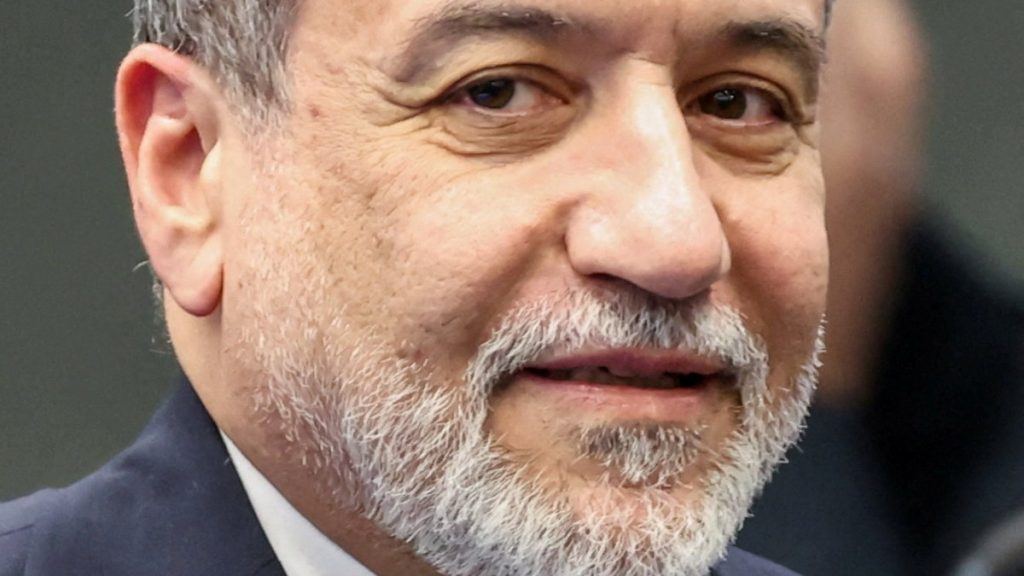
Foreign Minister Abbas Araghchi’s remarks in advance of Geneva talks come as a second US aircraft carrier heads towards the Middle East. Listen to this article Listen to this article | 3 mins info Iranian Minister of Foreign Affairs Abbas Araghchi has said that a deal with the United States to avert conflict is “within reach”, in advance of talks between the two countries in Geneva, Switzerland. Araghchi said that the “historic opportunity to strike an unprecedented agreement” would depend on whether “diplomacy is given priority”, in a possible reference to US President Donald Trump’s ongoing threats to use military force against Iran. Recommended Stories list of 4 itemsend of list In a statement shared on social media on Tuesday, Iran’s top diplomat added that his country remained “crystal clear” that it would “under no circumstances ever develop a nuclear weapon“, while also recognising the right of Iran’s people to the benefits of “peaceful nuclear technology”. Indirect talks scheduled for Thursday in Geneva will be the third round of discussions between Washington and Tehran, mediated by Oman, which has said it hopes to see “a positive push to go the extra mile towards finalising the deal”. Delivering his State of the Union address in Washington, DC, later on Tuesday evening, Trump again struck a belligerent tone towards Tehran. While saying that he preferred diplomacy, he accused Iran of developing missiles that could “soon reach the United States of America”. “My preference is to solve this problem through diplomacy. But one thing is certain, I will never allow the world’s number one sponsor of terror, which they are, by far, to have a nuclear weapon. Can’t let that happen,” Trump said. Trump said that after the US attack on Iran’s nuclear sites in June 2025, “they were warned to make no future attempts to rebuild their weapons programme, in particular, nuclear weapons – yet they continue”. Advertisement “They’re starting it all over. We wiped it out, and they want to start all over again, and are at this moment, again, pursuing their sinister ambitions. We are in negotiations with them. They want to make a deal, but we haven’t heard those secret words: ‘We will never have a nuclear weapon’,” he added. ‘Strong fortress’ Araghchi has been leading the negotiations on behalf of Iran, while White House envoy Steve Witkoff and Trump’s son-in-law, Jared Kushner, have been representing the US. Following the most recent talks in Geneva, Trump said that Tehran had 10 to 15 days to make a “meaningful deal”, while again referring to the possible threat of military intervention amid a huge US military build-up near Iran. The talks on Thursday will take place as the US Navy has docked its largest aircraft carrier, the USS Gerald R Ford, at a NATO base on the Greek island of Crete, on its way towards the Middle East, where the US has been increasing its military presence in recent weeks. Iran’s Revolutionary Guard Corps (IRGC) has also been conducting military drills in the south of the country, saying that it has built “a strong fortress” in the area. Al Jazeera’s Tohid Asadi, reporting from Tehran, said that “the public mood in Iran is a mixture of different sentiments, and oscillation between fear of the war, in terms of the military build-up by the Americans in the region, and hope for diplomacy”. Asadi said the talks were taking place alongside “public dissatisfaction”, as seen with the “massive protests” that took place across Iran in December, “initially driven by the economic hardship“. “Right now, we also hear sounds echoing of dissatisfaction in political and social spheres, over the past three days at least, in some major universities in the capital and across the country,” he added. The US has acknowledged that it caused a shortage of US dollars in Iran, contributing to severe economic consequences, including the collapse of one of Iran’s largest banks in the lead-up to December’s street protests. Adblock test (Why?)
Tokyo protests as China blocks ‘dual-use’ exports to 20 Japanese companies

China’s Commerce Ministry says the move against Japanese firms will prevent the remilitarisation of Japan. Listen to this article Listen to this article | 4 mins info Japan has strongly protested China’s move to restrict the export of “dual-use” items to 20 Japanese business entities that Beijing says could be used for military purposes, in the latest twist in a months-long diplomatic row between the two countries. Japanese Deputy Chief Cabinet Secretary Sato Kei said at a news conference that the move by China’s Ministry of Commerce on Tuesday was “deplorable” and would “not be tolerated” by Tokyo. Recommended Stories list of 4 itemsend of list Companies affected by China’s export ban on dual-use items, or items that can be used for civilian or military purposes, include Mitsubishi Heavy Industries’ shipbuilding group, aerospace and marine machinery subsidiaries, Kawasaki Heavy Industries, Japan’s National Defense Academy, and the Japan Aerospace Exploration Agency. Beijing said restricting the export of dual-use items to the Japanese firms was necessary to “safeguard national security and interests and fulfil international obligations such as non-proliferation”, adding that the companies were involved in “enhancing Japan’s military strength”. China’s Commerce Ministry said on Tuesday that it would also add another 20 entities to its export restrictions watchlist, including Japanese automaker Subaru, petroleum company ENEOS Corporation, and Mitsubishi Materials Corporation. Chinese exporters must submit a risk assessment report for each company to ensure “dual-use items will not be used for any purpose that would enhance Japan’s military strength”, according to a statement on the Commerce Ministry’s website. Advertisement China has imposed similar restrictions on the US and Taiwan as a form of political protest, particularly over Washington’s ongoing unofficial support for the self-governed island. Beijing claims democratic Taiwan as its territory and has not ruled out using force for “reunification”. Tokyo and Beijing have a historically acrimonious relationship, but diplomatic ties took a turn for the worse in November, when Japanese Prime Minister Sanae Takaichi told legislators that a Chinese attack on Taiwan would constitute a “survival-threatening situation” for Japan, which could necessitate military action. Japan has had a pacifist constitution which restricts its use of force, but an attack on Taiwan could legally allow Tokyo to activate its army, the Self-Defence Forces, Takaichi said. Takaichi’s remarks were some of the most explicit regarding whether Japan could become involved in a conflict in the Taiwan Strait, and have been accompanied by a push to expand Japan’s military capability. Beijing reacted with fury to Takaichi’s remarks, discouraging Chinese citizens from visiting Japan, leading to a major drop in tourism revenue from Chinese visitors. In January, Beijing also imposed Japanese export restrictions on rare earths like gallium, germanium, graphite and rare earth magnets that could be used for defence purposes, according to the US-based Centre for Strategic and International Studies (CSIS) think tank. The CSIS said at the time that “these retaliatory measures underscore rising tensions between Beijing and Tokyo and serve as a pointed warning from China to countries that take explicit positions on cross-strait relations”. Tokyo does not have official diplomatic relations with Taiwan, but several of its outlying islands, including Okinawa, are geographically closer to Taiwan than mainland Japan. Taiwan is also enormously popular with the Japanese public. Adblock test (Why?)
With ‘El Mencho’ killed, what’s next for Mexico and the Jalisco cartel?
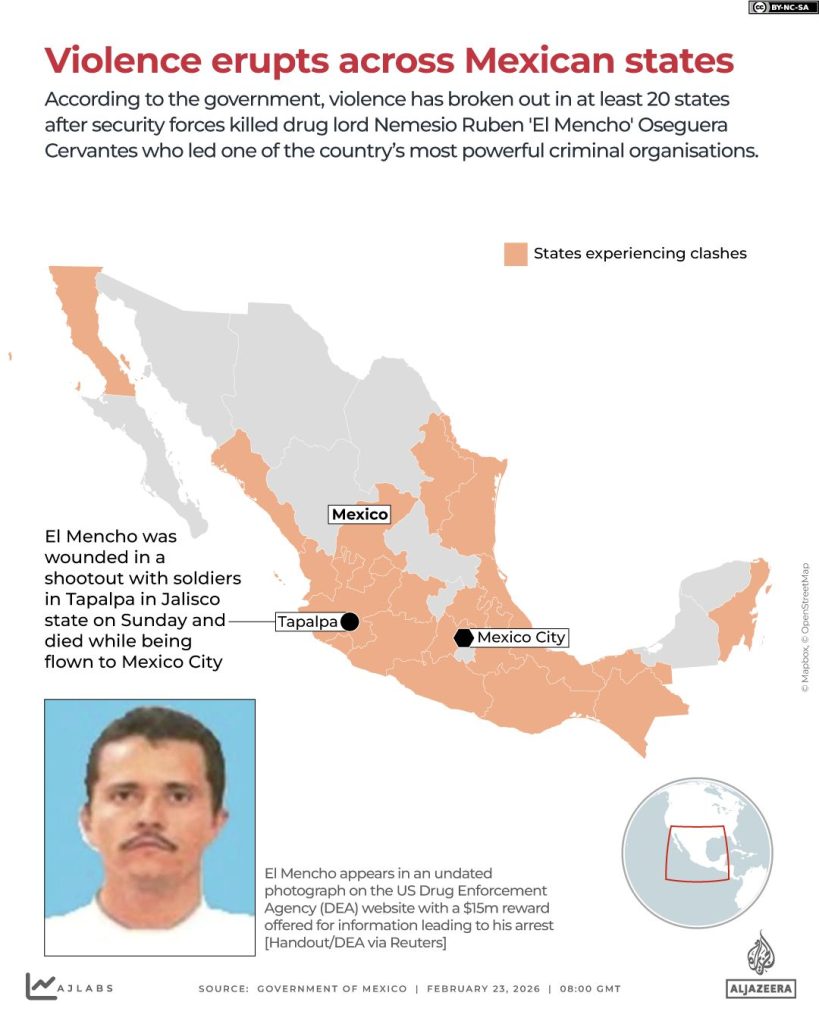
The killing of Nemesio Ruben Oseguera Cervantes, the leader of the Jalisco New Generation Cartel (Cartel Jalisco Nueva Generacion, or CJNG), has triggered a wave of violence across several Mexican states, including Jalisco. Cervantes, better known as “El Mencho”, was killed in an operation by Mexico’s army on Sunday. Recommended Stories list of 2 itemsend of list But what is the Jalisco cartel, and what happens next after the killing of one of the most powerful drug lords in the country? What happened in Mexico on Sunday? Shortly after news of El Mencho‘s killing spread, suspected cartel members launched coordinated reprisals across multiple states. Attackers torched convenience stores and petrol stations, dragged trucks onto major highways and erected flaming roadblocks, known locally as narcobloqueos, paralysing cities and cutting off key routes. “Panic spread among many people,” Miguel Alfonso Meza, director of Defensorx, a Mexican civil organisation dedicated to strategic litigation and the defence of human rights, told Al Jazeera. “I heard from several relatives who had panic attacks; they were calling in tears, desperate, because they didn’t know what was going to happen,” he added. The violence appeared intended to project strength and demonstrate the cartel’s reach following the loss of its leader. In Jalisco alone, more than 25 National Guard members were killed. “That makes it one of the bloodiest days, with some of the greatest losses for the federal government,” Meza said. “It is also the first time we’ve seen coordinated attacks across more than 20 states at once. Advertisement “I call it a terrorist attack,” he added, “in the sense that groups are labelled ‘terrorist’ when they use violence to instil fear in the population. And that is exactly what we experienced.” What is the Jalisco New Generation Cartel? The Jalisco cartel is one of Mexico’s most powerful criminal organisations. Founded in about 2009-2010, the group emerged from the remnants of the Milenio cartel and quickly grew into a dominant force in the country’s drug trade. It built a reputation for ruthlessness and violence unlike any since the fall of the old Zetas cartel. Los Zetas were one of Mexico’s most feared criminal groups, founded by former elite soldiers who deserted and brought military tactics into organised crime. They became notorious for using extreme brutality and for expanding beyond drug trafficking into kidnapping, extortion and fuel theft. What does the cartel do? The United States Department of State has described the cartel as one of Mexico’s most powerful drug trafficking organisations, with significant cocaine, heroin and methamphetamine distribution networks, and in recent years a major role in fentanyl trafficking into the US. Fentanyl is a powerful synthetic opioid linked to thousands of deaths in the US. Beyond drug trafficking, the group profits from extortion, migrant smuggling, and oil and mineral theft. It operates across much of Mexico and has built international trafficking routes stretching through Latin America to the US and parts of Asia. The cartel has also been linked to a series of high-profile attacks against security forces and public officials. In 2015, gunmen shot down a Mexican military helicopter with a rocket-propelled grenade during an operation to capture its leader. In June 2020, the group attempted to assassinate then public security secretary Omar Garcia Harfuch in Mexico City. He survived. Two bodyguards and a civilian were killed. How does it operate? Analysts say the cartel’s growth has been driven as much by strategy as by brutality. “The CJNG has normalised the worst horrors of the Mexican drug wars, bodies hanging from lampposts, decapitated heads on the side of the road,” Chris Dalby, senior analyst at Dyami Security Intelligence, told Al Jazeera. But he argues the violence is not random. It is deliberate and performative, designed to dominate rivals quickly and discourage resistance. “That was an aberration a generation ago. The CJNG made it almost daily news. And that’s because of the way El Mencho trained his cartel. Advertisement “He trained them almost like Genghis Khan in their approach to conquest,” Dalby said, referring to the feared Mongol warrior. “They would wipe out opposition and use that as a warning: If you oppose us, this is what will happen to you.” That approach helped the cartel grow quickly across multiple states, but it also meant constant confrontation. Much of its influence rests on mobility, intimidation and strategic alliances rather than deeply rooted territorial control. Smoke billows from burning vehicles in Puerto Vallarta amid a wave of violence, with torched vehicles and gunmen blocking highways in more than half a dozen states [Reuters] What is next for Mexico after the killing of ‘El Mencho’? The death of Nemesio “El Mencho” Oseguera is one of the most significant blows to a Mexican criminal organisation. While experts note the CJNG may now be in a “weaker position”, many warn that “decapitating” the cartel without dismantling its resources is a mistake. Critics argue that instead of long-term “financial strangulation”, the government has returned to a strategy that previously failed during the presidency of Felipe Calderon (2006-2012). Under Calderon, a hardline military offensive targeted cartel leaders in an effort to dismantle organised crime. But while several senior drug kingpins were captured or killed, the crackdown led to violent fragmentation. Hundreds of thousands were killed or disappeared in the years that followed, yet criminal groups ultimately adapted and continued to expand. When the current governing party, Morena, came to power in 2018 under former President Andres Manuel Lopez Obrador, it promised a different approach. Obrador’s slogan, “abrazos, no balazos” (“hugs, not bullets”), signalled a move away from high-profile kingpin takedowns towards social programmes and addressing root causes of violence. Former Mexican President Andres Manuel Lopez Obrador [FILE: Quetzalli Nicte-Ha/Reuters] Critics now question whether that strategy has eroded amid sustained US pressure on President Claudia Sheinbaum to curb drug trafficking, particularly fentanyl, with Washington repeatedly urging tougher action against major cartels. In Sunday’s operation, the Mexican government stated it was carried out by Mexican special forces with intelligence support from the US.
US women’s ice hockey team declines Trump’s State of the Union invitation
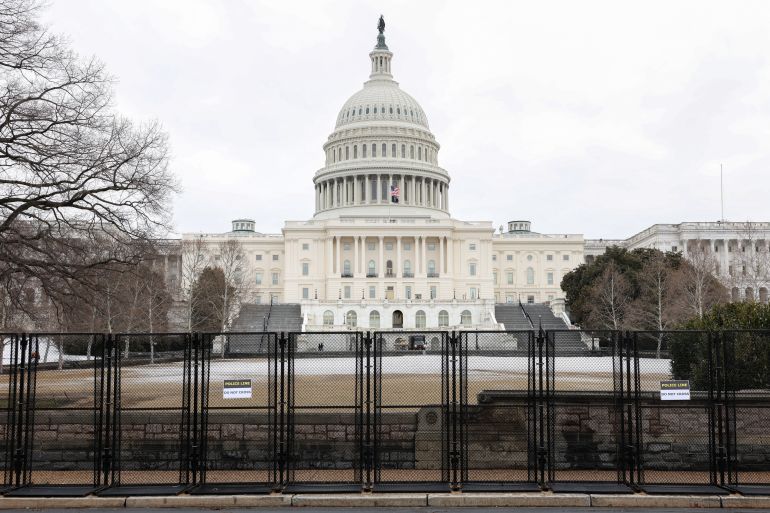
Olympics gold medal-winning team has politely turned down a request from President Donald Trump to attend his address in the capital. Listen to this article Listen to this article | 2 mins info Published On 24 Feb 202624 Feb 2026 Click here to share on social media share2 Share The women’s ice hockey team of the United States has declined an invitation to President Donald Trump’s State of the Union address, US media reported, after he joked he would be “impeached” if he did not ask them to attend. NBC cited a statement from the women’s team on Monday, saying players would be “unable to participate” in the State of the Union address. Recommended Stories list of 2 itemsend of list “We are sincerely grateful for the invitation extended to our gold medal-winning US Women’s Hockey Team and deeply appreciate the recognition of their extraordinary achievement,” the statement said. “Due to the timing and previously scheduled academic and professional commitments following the Games, the athletes are unable to participate.” Both Republicans and Democrats traditionally bring guests to watch the president’s annual address to Congress, and Trump invited the US men’s ice hockey team after they won Olympic gold on Sunday. Team USA’s women’s team won gold for the first time since 2018 when they beat the Canadians 2-1 on Thursday. In a video shared online, Trump can be heard on speakerphone in a call with the men’s team, inviting them to the address before saying, “We’re gonna have to bring the women’s team, you do know that”, to which the players laugh. “I do believe I would probably be impeached, OK?” the president added. It is not clear if the men’s team have formally accepted Trump’s invitation, but they can be heard cheering and saying, “We’re in.” The AFP news agency has contacted the team for comment. Security fencing surrounds the US Capitol in advance of the US president’s State of the Union address, in Washington, DC [Kylie Cooper/Reuters] Adblock test (Why?)
Schools shut, troops on streets: Mexico on alert after ‘El Mencho’ killing

Authorities deploy 10,000 soldiers nationwide to quell violence following the drug lord’s killing in a military operation. Listen to this article Listen to this article | 3 mins info Published On 24 Feb 202624 Feb 2026 Click here to share on social media share2 Share Mexico remains on high alert after a wave of reprisal attacks triggered by the killing of its most wanted drug cartel leader, even as President Claudia Sheinbaum claimed the country is at peace and life is returning to normal. Some 10,000 soldiers have been deployed across 20 of Mexico’s 32 states to maintain order following the killing of Nemesio “El Mencho” Oseguera in a military operation about 130km (80 miles) from Guadalajara city on Sunday. Recommended Stories list of 4 itemsend of list Guadalajara is the capital of western Mexico’s Jalisco state – the stronghold of Oseguera’s Jalisco New Generation Cartel (CJNG) – where at least 2,000 soldiers have been sent. Schools in Guadalajara and several other Mexican cities were closed on Monday. However, public transport partially resumed, though buses carried few passengers, as people witnessed a slow return to normalcy. Security Minister Omar Garcia Harfuch said on Monday that at least 74 people were killed, including 25 National Guard officers, in the operation that killed the cartel boss and the subsequent violence over the killing of the 59-year-old drug kingpin, one of the most wanted men in Mexico and the United States. Burned-out vehicles are seen on the boardwalk in Puerto Vallarta, Mexico [Arturo Montero/EPA] “El Mencho” was considered the last of the drug lords who acted in the brutal mould of the now-imprisoned Joaquin “El Chapo” Guzman and Ismael “El Mayo” Zambada, of the rival Sinaloa Cartel. He was a founding member of CJNG, which was formed in 2009 and has grown into one of Mexico’s most violent crime organisations. Advertisement Following his killing, suspected CJNG members set fire to cars in several states and blocked numerous roads. They also attacked banks, petrol stations and shops. Al Jazeera’s John Holman, reporting from Mexico City, said there was an eerie quiet in the country following El Mencho’s killing. “Many businesses are closed, and the trucks that the CJNG cartel dragged across roads to stop Mexican security forces and create chaos have been moved out of the way,” Holman said. Meanwhile, President Sheinbaum said on Monday that peace had returned to the country. “Mexico is calm. We woke up without any roadblocks, and all activity has been restored,” she said. The White House confirmed that the US provided intelligence support to the operation to capture the cartel leader and applauded Mexico’s army for taking down a man who was one of the most wanted criminals in both countries. Sheinbaum stressed that only Mexican forces were involved in the operation. “There was no participation in the operation by US forces. What we have is a lot of exchange of information provided by the US government, but the entire operation, from its planning stage, is the responsibility of [Mexico’s] federal forces,” the president said. Experts now warn that the “absence of a direct succession” within CJNG could lead to a power vacuum and violent fights to fill it. Adblock test (Why?)
Cartel attacks kill more than two dozen people in Mexico
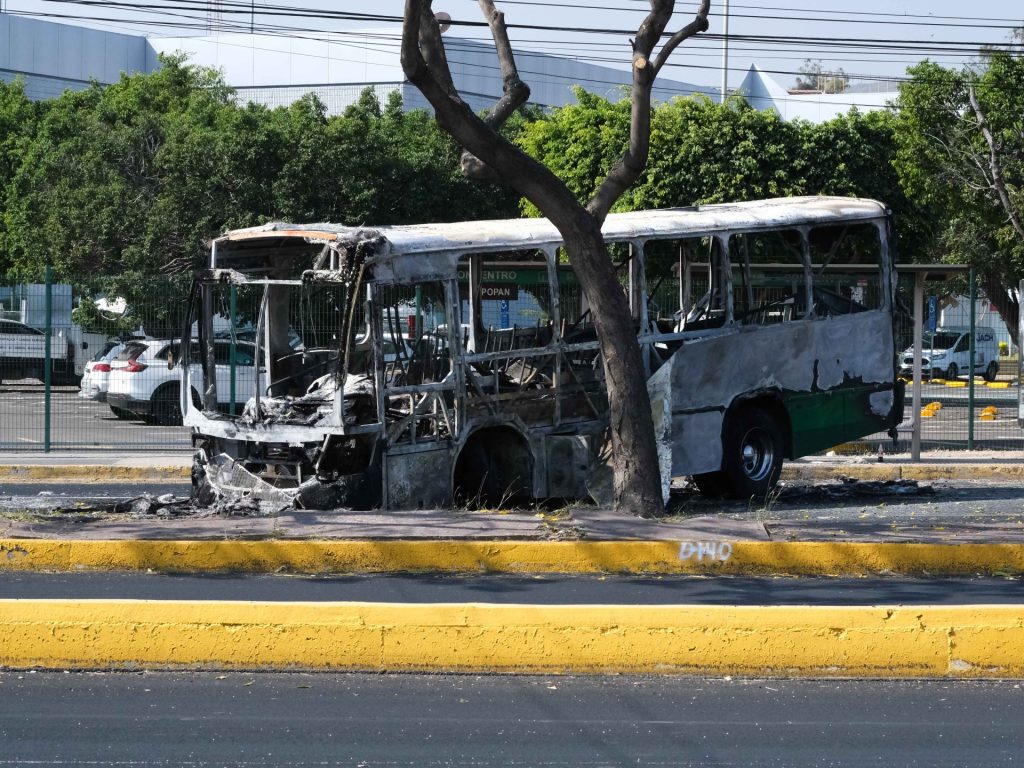
NewsFeed Cartel reprisals for the killing of drug lord Nemesio “El Mencho” Oseguera killed at least 25 Mexican National Guard soldiers, a prison guard, a state official, and a civilian, according to the country’s security secretary. Published On 23 Feb 202623 Feb 2026 Click here to share on social media share2 Share Adblock test (Why?)
Putin’s strategy is that Ukraine will fall before he does: Ex-FM Kuleba
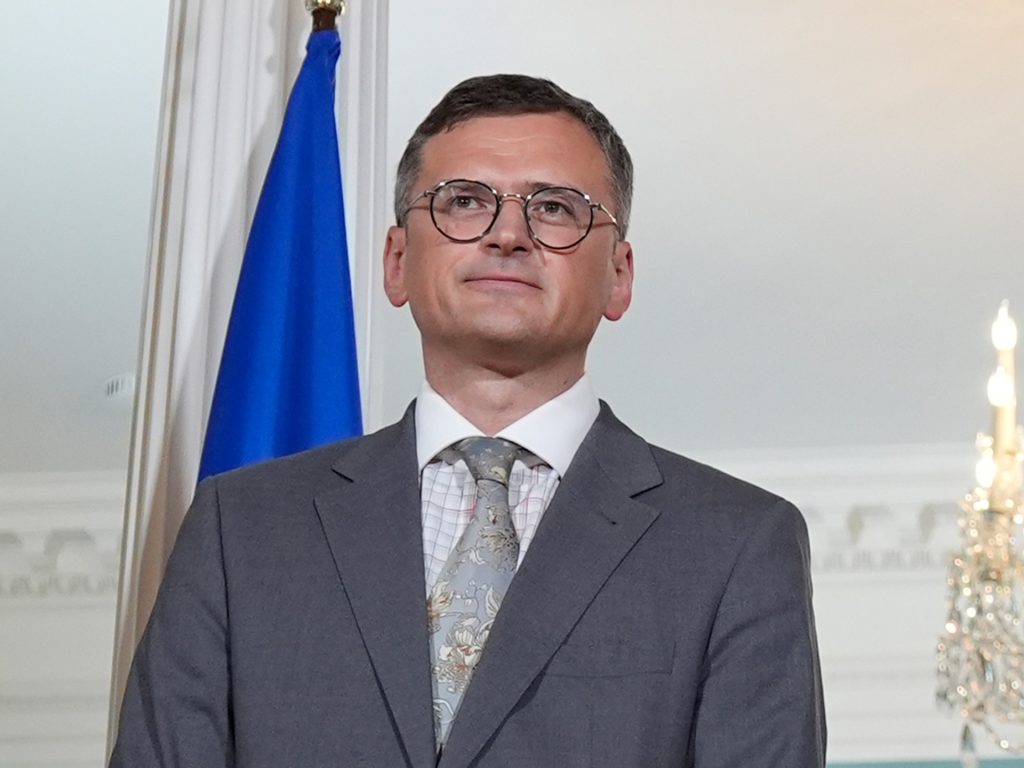
As Ukraine marks four years since Russia’s full-scale invasion on Tuesday, Dmytro Kuleba, the war-torn nation’s former foreign minister from 2020 until 2024, talks to Al Jazeera about how early expectations of a short war gave way to a grinding conflict with no clear end in sight. From shifting definitions of victory and growing fractures among Ukraine’s allies to negotiations with Moscow and lessons learned in the Global South, Kuleba reflected on what survival, realism and resolve mean for Ukraine today. Recommended Stories list of 4 itemsend of list The 44-year-old, who is now an associate professor at Sciences Po in France and a non-resident senior fellow at Harvard Kennedy School, spoke to Al Jazeera via video-link from Kyiv, where he resides. Here’s our interview, which has been lightly edited for clarity and brevity. Al Jazeera: As the war enters a fifth year, is there any room for optimism? Dmytro Kuleba: Optimism should be rooted in reality, and there will be no ceasefire until the end of winter in Ukraine. I do not mean the calendar winter; I mean the temperatures and the weather. [Russian President Vladimir] Putin has been ruthlessly destroying our energy system and plunging millions of Ukrainians into cold and darkness to break them down, not to make a good deal with them. After winter ends, there will be a slim chance for a ceasefire, and whether the slim chance can become real, will depend on two factors. First, whether Russia will be able to make advances on the battlefield, because if it does, it will have zero incentive to stop. Advertisement And secondly, whether the Russian economy will cripple under the pressure of mounting problems. Al Jazeera: Is Russia negotiating in good faith or buying time with the current talks? Kuleba: Russia, throughout its history, has not been particularly famous for negotiating in good faith. They are testing how much they can achieve at the negotiating table instead of achieving the same goals on the battlefield. Secondly, they are engaging in meaningful conversation, trying to understand how a potential ceasefire could work from a technical perspective, just to have that frame on the table. But meaningful does not mean in good faith. Putin believes he can win the war. He believes he’s making progress on the battlefield and that he can manage problems in the Russian economy. His strategy is that Ukraine is going to fall before he does. Al Jazeera: Is the current situation something you imagined back in February 2022? Kuleba: When war breaks out, your first instinct is to believe that it’s not going to last long … and all you have to do is just to survive the first attack, and then the attacking side will realise that it failed to achieve its goals. But while keeping this instinctive scenario on your mind, you always have to also remember that things may last longer than you expect. Did I expect the war to last for four years? No, I didn’t. But was I preparing myself for a long war? Yes, somewhere in the back of my mind, I was keeping that option open. Al Jazeera: What does victory mean to you now? Kuleba: It started as a nightmare, and by the end of [2022], we captured half of the territories Russia had captured in the first months of the invasion, and we were pushing them back on old fronts. [Russian troops] were struggling to stabilise the front line; a sense of euphoria dominated in Ukraine, both among the decision-makers and the population. This was the moment when victory was defined as regaining control of the 1991 border, which had existed before Russia annexed Crimea and intervened in the east of Ukraine in 2014. But this hope … did not pass the reality check by the end of 2023, when our big counteroffensive failed to deliver. Since then, politicians and people in Ukraine find it more and more difficult to redefine victory and speak about it, which I think is a big problem, because if you do not define what your final goal is, you will never get it. So I offer my understanding of victory today, which would be to cease fire along the existing front line to stop hostilities and introduce a provisional truce between Russia and Ukraine to receive a long multi-year programme of military support to Ukraine; to launch a multi-billion recovery plan for Ukraine, and to see Ukraine as a member of the European Union. Advertisement Victory should always be defined, not only against your own goals, but also against the initial goals of your enemy. So if I look back at 2022 and assume that Russia’s main objective was the demolition of the Ukrainian statehood and the return of Ukraine under its full control, then … Russia failed. Al Jazeera: Do you feel the West and your vision are aligned? Kuleba: The West doesn’t really exist anymore in the form we are used to thinking about it. Europe is aligned. Some countries outside of Europe, which belong to what used to be the West, are aligned as well, such as Japan, Australia, and other nations. The United States holds a different view now; they just want to end hostilities at any cost. Al Jazeera: What security guarantees does Ukraine need for a potential ceasefire to hold? Kuleba: It would be Russia accepting that Ukraine has a right to exist as an independent, sovereign and European nation. Everything in between a potential ceasefire and the acceptance of this fact will be a conflict, taking one form or another. Al Jazeera: Is there still defiance among Ukrainians? Kuleba: We won the winter battle. It was the battle for our resolve and stamina, and Putin hoped we would be broken. We are exhausted, but not broken. Al Jazeera: What would you say to Ukraine’s backers who have expressed concern about recent corruption scandals? A big corruption case always triggers two reactions. If you want to argue, if your goal
Israel bans 5 Palestinian media organisations from occupied East Jerusalem
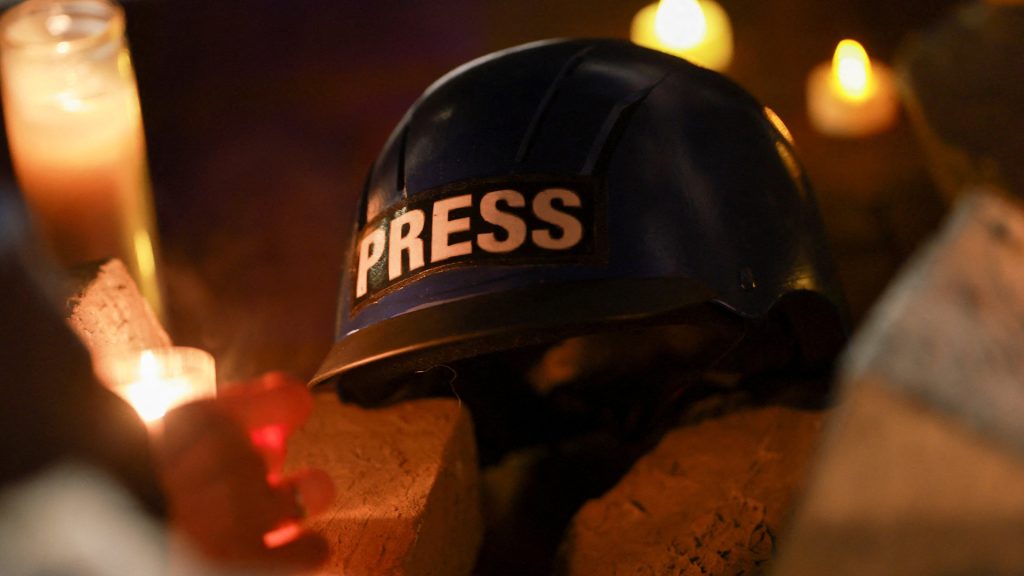
NewsFeed Israeli Defence Minister Israel Katz has issued an order banning the work of five Palestinian local media organisations based in occupied East Jerusalem, accusing them of links to Hamas and causing “incitement”. Published On 23 Feb 202623 Feb 2026 Click here to share on social media share2 Share Adblock test (Why?)

